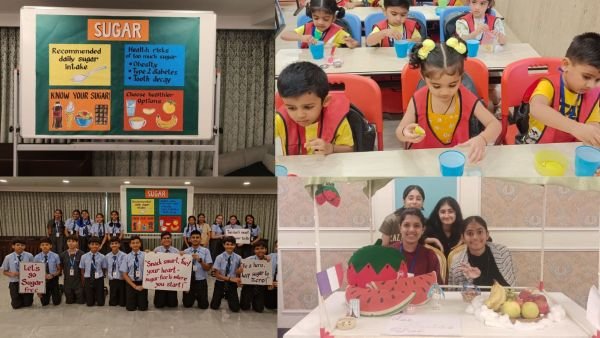
CBSE and CISCE Push for Healthier Schools, But Parents Call for Real Action Beyond Posters
With rising concerns over childhood obesity and poor dietary habits, India’s two major school boards — CBSE and CISCE — have stepped up their efforts to promote health and fitness among schoolchildren. New initiatives such as the sugar board, oil board, and Active CISCE are being introduced to transform school campuses into health-conscious spaces. But while schools have started implementing these programmes, many parents and educators feel that more meaningful, behaviour-based change is needed beyond just posters and slogans.
A Timely Response to Growing Health Concerns
India is witnessing an alarming rise in lifestyle-related illnesses, not just among adults but among school-aged children too. The National Family Health Survey (2019–21) reported that over 20% of adults in urban areas are either overweight or obese, with similar trends increasingly seen among younger populations. In response, CBSE and CISCE launched new programmes that integrate physical activity, balanced nutrition, and fitness tracking into daily school routines.
While these efforts echo existing international frameworks — such as those adopted in countries like Japan, Canada, the US, and the UK — India’s school systems are only beginning to institutionalise wellness in a structured way.
Boards Encourage Nutrition Boards, Healthy Menus, and Fitness Portals
CBSE has asked affiliated schools to install “sugar” and “oil” boards across campuses. These boards visually display information about the hidden sugar and fat content in everyday food items, aiming to create awareness among students and staff. Similarly, CISCE has launched the ACTIVE CISCE portal, a fitness tracking system for Classes 1 to 12 that offers individual fitness reports based on age and gender.
Principals are taking the directive seriously. For instance, Sameer Arora, principal of Shiv Nadar Public School in Gurugram, said the school has already redesigned its menu with healthier alternatives like wheat buns and soya-stuffed burgers. “We’ve also included traditional drinks sweetened with jaggery. But for real impact, change has to begin at home, continue in school, and be supported by society,” he added.
At WITTY International School in Mumbai, principal Suchita Malakar shared how the school had already taken steps before the official directive. “We had seen cases of obesity and diabetes among students. So, we introduced fresh juices and banned canned foods. We even held discussions with parents, teachers, and cafeteria staff to make sure everyone was on the same page.”
Workshops, awareness sessions, and even slogan-writing contests are now being conducted to help students understand the importance of food labels and mindful eating habits.
Real Change Goes Beyond Visual Boards
While the boards are a visible reminder, many parents and school leaders say it’s the behavioural shift that matters most. Dr Jaya Parekh, principal of DPS Hinjawadi, mentioned how students were initially excited to participate in health activities. The school introduced a wellness programme called ‘Samruja’, inviting experts to talk about nutrition and overall well-being.
At The Oxford Senior Secondary School in Bengaluru, sugar boards were implemented in June. Posters with infographics were placed throughout the campus — from bulletin boards to inside classrooms — to drive home the message about high-sugar foods.
Similarly, DPS Mysore has gone a step further by monitoring students’ sugar and carb intake through regular surveys and interactions. A wellness club at the school now prepares detailed presentations to explain the impact of poor nutrition.
Yet, educators and parents argue that real change requires more than weekly fruit juices or workshops. “The toughest part is when children are out of sight,” said Suchita Malakar, who shared a personal story of finding hidden juice cans under her children’s pillows.
Parents Urge Schools to Fix Deeper Issues
Parents believe the issue goes beyond unhealthy food — it’s also about school structure. Aarti Srivastava, a parent and businesswoman, pointed out how long school hours, minimal physical breaks, and lack of playgrounds are contributing to a sedentary lifestyle. “Even the canteens that sell junk food undermine classroom lessons on healthy eating,” she added.
Another parent recounted how her child, a Class 2 student, constantly asked for money to buy chocolates sold just outside her classroom. Despite complaints, the issue remained unresolved.
Aprajita Gautam, President of the Delhi Parents Association, and Sukhpal Singh, founder of the NCR Parents Association, said that the boards are a good start — but inspections, accountability, and ongoing parent-school-government collaboration are critical. “We need to go beyond awareness and work towards behavioural transformation through sustained efforts,” Singh stressed.
Gautam added that health education in schools is often limited to textbook chapters taught for exams. “How can schools preach healthy living in class while selling chips and cola just outside?”
Looking at Global Best Practices
Other countries offer useful models. Japan, for example, began incorporating school health systems as early as the 1870s. Today, their health laws ensure school physicians, immunisation, and collaboration between schools and communities. Canada’s model is based on four pillars — policy, learning, environment, and partnerships. The US, through its CDC-backed Whole School, Whole Community, Whole Child initiative, supports schools with funding and training to ensure students’ mental and physical well-being.
India’s efforts are in the right direction — but real progress will come when awareness translates into action, and action into habit.
Also Read: Top 10 Engineering Colleges in India for Mechanical Engineering: Courses, Placements, Recruiters
Also Read: AU students protest over hostel food quality, campus safety